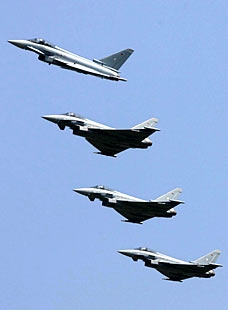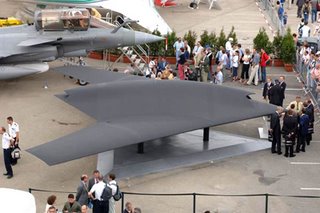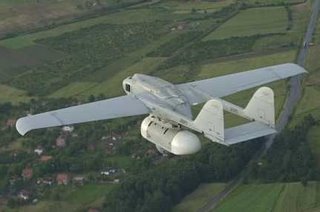 According to The Times, the MoD is poised to award BAE Systems a £200 million contract to create the UK's first unmanned fighter jet.
According to The Times, the MoD is poised to award BAE Systems a £200 million contract to create the UK's first unmanned fighter jet.This is a development arising from last December's Defence Industry Strategy, which has profound political implications. As always though, opposition parties and the MSM seem to be unaware of their importance.
The new contract is also important for British industry as, sneaked into the strategy – also largely ignored by the MSM - it emerged that the government had abandoned any plans to build a next-generation manned fighter aircraft. For a heritage which included Camel, Spitfire and Lightning, it was the end of the line.
However, that left open the possibility that the UK was to focus on the producing unmanned aircraft (UAVs), with the government arguing that maintaining a capability in this area is a vital part of our defence sovereignty.
To this blog, this issue has been something of a litmus test. The UK had been heavily involved in UAV development with the United States through the £10 billion FOAS programme, which it had abandoned suddenly in June 2005.
 We were then suspicious that the MoD would then join in the French-led Neuron programme (right) to create a pan-European programme, which seemed to be powering ahead.
We were then suspicious that the MoD would then join in the French-led Neuron programme (right) to create a pan-European programme, which seemed to be powering ahead.Our suspicions were strengthened when France and the UK announced they were to co-operate in certain aspects of the technology.
Even then, however, BAE Systems were working on their own UAVs, one known as the Corax, the other the Raven. Then, in June of this year the company unveiled a new machine called the "Herti" standing for: "High Endurance Rapid Technology Insertion" (illustrated, below left).
 Now, it would appear that this endeavour is about to be rewarded with the award of the unmanned fighter contract, enabling BAE to develop a "technical demonstrator" version of the aircraft. This will be a full working model with weapons and targeting systems, which will then form the base design for a future generation of fighters.
Now, it would appear that this endeavour is about to be rewarded with the award of the unmanned fighter contract, enabling BAE to develop a "technical demonstrator" version of the aircraft. This will be a full working model with weapons and targeting systems, which will then form the base design for a future generation of fighters.The Times tells us that the £200 million contract is thought to be the largest experimental project financed by the MoD since it funded the development of the Eurofighter – which this points to one of four important political issues.
First, it should be an issue that the contract has been awarded to BAE Systems, a company with a more than chequered history in keeping defence contracts under control. To give the company yet another £200 million for a project which – if FOAS is any guide – could eventually be worth more than £10 billion, without the most searching of debates, seems unwise.
Secondly, we really need to be asking whether unmanned fighters are the right route to follow, and whether alternatives have been properly considered. Operational experience with UAVs have shown that they chew up bandwidth, which imposes considerable limitations on the number that can be deployed in any given area.
While BAE Systems have been successfully working on autonomous capabilities (enabling the machine to fly itself and make basic mission decisions), thus reducing bandwith requirements, any machine which is to be used to kill a human must have another human in the command loop. We cannot permit automated killing robots. Effective command, however, will require considerable data transmission to ensure that informed decisions are made, in which case there will still be high bandwidth demands and thus limits on the number of machines that can be operated.
Other options include the development of high performance, long-range air-to-air missiles which are so capable that they can be launched from any airborne platform, such as a transport aircraft (like the C-130) an air tanker, or even from an AWACS, dispensing with the need for a high performance fighter. Such developments would make UAVs irrelevant, except that they, themselves could become missile platforms.
 This then relates to the fourth and final issue, one we have discussed before in the context of the chequered history of British UAV projects, with disasters like the Phoenix (illustrated). Despite massive expenditure, British manufacturers have yet to deliver a worthwhile machine so should we be committing any expenditure to British ventures?
This then relates to the fourth and final issue, one we have discussed before in the context of the chequered history of British UAV projects, with disasters like the Phoenix (illustrated). Despite massive expenditure, British manufacturers have yet to deliver a worthwhile machine so should we be committing any expenditure to British ventures?This is probably the most political of all the issues as we have a choice of potential partners, the Europeans and the Americans, and choice of either would have considerable political implications.
Already, despite this government's commitment to European defence integration, it has recently incurred the wrath of French by refusing to endorse a three-year spending plan for the European Defence Agency, with Michele Alliot-Marie accusing Britain of undermining efforts to build a common EU defence policy. A go-it-alone policy on UAVs is hardly likely to endear us to our European "partners". And any British Europhiles might be very angry.
On the other hand, we are already co-operating closely with the IS on the operation of the Predator UAV and are purchasing some machines for Afghanistan.
 And, while the MoD is paying the French-owned Thales company upwards of £700 million to develop an Israeli design as the Watchkeeper UAV, in one of those convoluted deals that defy comprehension, British-owned BAE Systems – the very one getting £200 million of British money for UAV development – is developing the tactical UAV, called the Skylynx (illustrated) for the US Marine Corps, a system that is, according to BAE Systems, "capable of satisfying current and future Marine Corps requirements".
And, while the MoD is paying the French-owned Thales company upwards of £700 million to develop an Israeli design as the Watchkeeper UAV, in one of those convoluted deals that defy comprehension, British-owned BAE Systems – the very one getting £200 million of British money for UAV development – is developing the tactical UAV, called the Skylynx (illustrated) for the US Marine Corps, a system that is, according to BAE Systems, "capable of satisfying current and future Marine Corps requirements".Of course, all the decisions made, and about to be made, could be perfectly sensible, well-founded and above board, as are so many in defence procurement circles. But then, it is just possible that the UK is about to embark on another costly and wasteful exercise.
Either way, though, one would have thought that a switched-on opposition would want to be sure.
COMMENT THREAD
